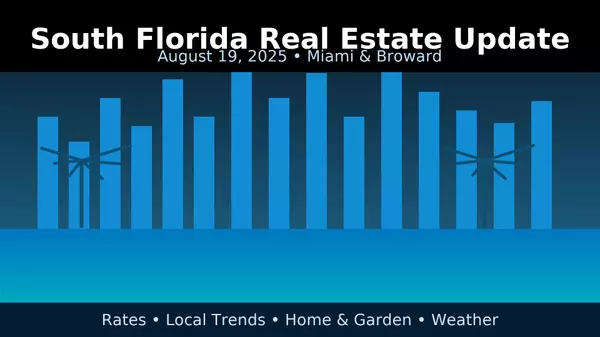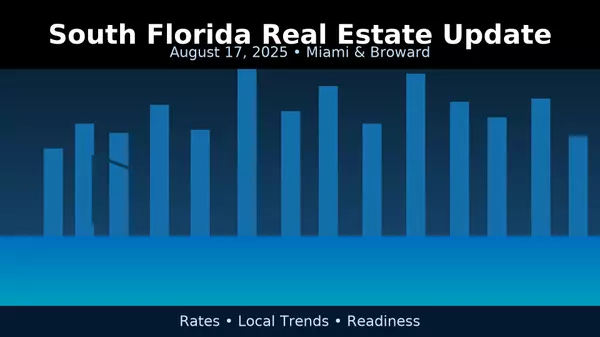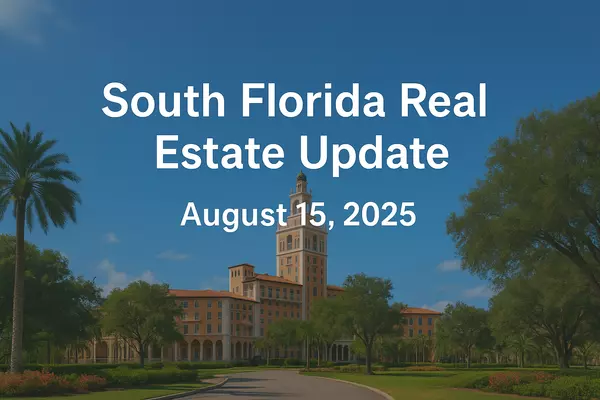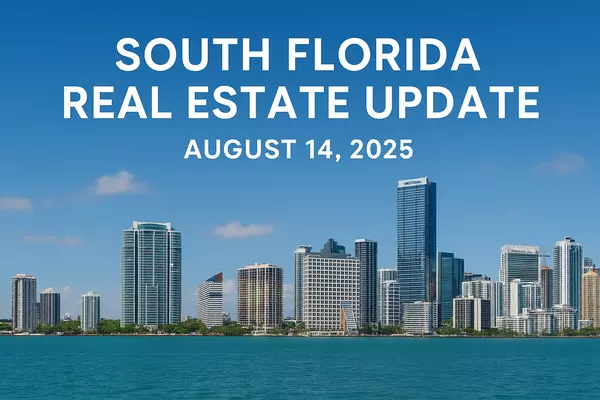Understanding the Impact of Interest Rates on Miami's Real Estate Market
Interest rates play a crucial role in shaping the real estate market, and Miami is no exception. As a vibrant and dynamic city, Miami's property market is influenced by various factors, including changes in interest rates. In this blog, we’ll explore how interest rates affect the real estate market in Miami and what potential buyers and sellers should consider in this context.
The Relationship Between Interest Rates and Real Estate
Interest rates, determined by the Federal Reserve, influence the cost of borrowing money. When interest rates are low, borrowing is cheaper, which can stimulate demand for real estate. Conversely, higher interest rates can increase the cost of mortgages, potentially dampening demand.
In simple terms, lower interest rates often lead to a booming real estate market because more people can afford to buy homes. On the other hand, higher rates can slow down the market because fewer people can afford to take out mortgages.
How Interest Rates Impact Homebuyers
-
Affordability: Higher interest rates mean higher monthly mortgage payments, making homes less affordable for buyers. For instance, with the current interest rate of 6.8%, the monthly payment on a $300,000 mortgage is significantly higher compared to when rates were at 3%. This can shrink the pool of potential buyers and decrease competition for properties.
-
Buying Power: With higher rates, buyers can afford lower-priced homes for the same monthly payment, reducing their buying power. This might push some buyers to look for homes in lower price brackets or in less expensive neighborhoods.
-
Loan Approval: Interest rates also affect loan approval processes. Higher rates might lead to stricter lending criteria, making it harder for buyers to qualify for loans. Lenders may require higher credit scores and larger down payments, adding another layer of challenge for prospective buyers.
How Interest Rates Impact Sellers
-
Market Demand: When interest rates are high, decreased demand can lead to slower sales and potentially lower selling prices. Sellers might experience fewer offers and a longer time on the market. In a market with high rates, sellers need to be prepared for their homes to sit on the market longer and may need to consider price reductions to attract buyers.
-
Pricing Strategy: Sellers need to consider interest rate trends when setting their asking prices. In a high-rate environment, they may need to be more competitive with pricing to attract buyers. This could mean pricing the home slightly lower than comparable properties or offering incentives like paying for closing costs to make the deal more attractive.
-
Market Strategy: Sellers should highlight features that make their home a good investment despite higher interest rates. This could include energy-efficient systems that reduce utility bills, or potential for rental income if the property is in a desirable location.
Current Trends and Predictions
As of mid-2024, interest rates have risen to around 6.8%, a significant increase from previous years. According to the latest data, this uptick has led to a cooling effect on the market, with some buyers pausing their home search in hopes of rates dropping.
However, the Miami market remains resilient due to its desirable location, strong economy, and high demand for housing. Experts predict that rates may continue to fluctuate based on economic conditions and policy changes, but the long-term outlook for Miami's real estate market remains positive.
Tips for Buyers and Sellers in the Current Market
For Buyers:
- Lock in Rates: If you find a favorable interest rate, consider locking it in with your lender to protect yourself from potential rate hikes. This can save you money over the life of your mortgage.
- Budget Wisely: Factor in possible rate changes when determining your budget. Leave some room for adjustments in your financial planning to account for higher monthly payments.
- Explore Different Loan Options: Consider adjustable-rate mortgages (ARMs) which might offer lower initial rates, though be aware of potential rate increases in the future.
For Sellers:
- Highlight Affordability: Emphasize any affordability features of your home in marketing materials, particularly if you have energy-efficient systems or other cost-saving amenities. Homes with lower overall costs can be more attractive to buyers facing higher interest rates.
- Be Responsive: Be prepared to act quickly if you receive offers, as motivated buyers will likely want to secure their financing promptly. A flexible and responsive approach can help close deals faster.
- Consider Offering Incentives: Offer to pay for a portion of the closing costs or buy down the buyer’s interest rate for the first few years. These incentives can make your home more appealing in a high-rate environment.
Conclusion
Interest rates are a key factor in the Miami real estate market, influencing both buyers and sellers. Staying informed about current trends and understanding how rates impact affordability and demand can help you make strategic decisions. Whether you're looking to buy or sell a home in Miami, being proactive and knowledgeable about interest rates will give you an advantage in this dynamic market.
For personalized advice and assistance with your real estate needs in Miami, contact William Gartin at 305-842-6097. As a seasoned realtor with eXp Realty, I am here to help you navigate the market and achieve your real estate goal
Categories
Recent Posts











